全国 2011 年 1 月高等教育自学考试英语(二)真题
I.语法、词汇。从 A、B、C、D 四个选项中,选择一个正确答案,并填在答题纸相应的位
置上。(本大题共 15 小题,每小题 1 分,共 15 分)
Complete each of the following sentences with the most likely answer. (15 points)
1. China is _______ old country with _______ long history.
A. an, a B. an, the
C. the, a D. the,/
2. We could not see the moon, for a cloud came _______.
A. at between B. in between
C. for between D. on between
3. We all think of you as the most suitable one to _______ the work.
A. take advantage of B. take care of
C. take charge of D. take in
4. Some of the hotels in our district are too expensive for ordinary people to
_______ for a night.
A. stay at B. stay up
C. stay of D. stay away
5. It must be John. Who else would _____ he does?
A. work hard as B. be working as hard as
C. do harder work than D. work harder than
6. His health has begun to ______ now that he is old.
A. decline B. decrease
C. declare D. defeat
�
7. Leave at once _______ I’ll beat you.
A. and B. or
C. however D. but
8. “Why didn’t you tell me this before?”“I _______ but I didn’t have the
chance.”
A. would B. would have
C. would rather D. could
9. The line was busy. Someone _______ the telephone.
A. must be using B. must use
C. must have been using D. should have been using
10. The boss urged his workers _______.
A. away B. off
C. up D. on
11. I know you will not let me _______.
A. in B. up
C. down D. out
12. Occasionally she and her husband _______ ride into the country for a
picnic.
A. could B. must
C. would D. should
13. If you buy two books, you’ll get another one _______
A. thrown away B. thrown off
C. thrown up D. thrown in
14. As _______ health, I have nothing useful to say as I have little
�
experience of illness.
A. regards B. regard
C. regardless D. regarding
15. The total effect of Edison’ s career _____ the sum of all of his
inventions.
A. excels B. succeeds
C. affects D. surpasses
II.完形填空。从 A、B、C、D 四个选项中,选择一个正确答案,并填在答题纸相
应的位置上。(本大题共 15 小题,每小题 1 分,共 15 分)
Fill in each blank in the passage with the most likely answer. (15 points)
Jenna, a popular girl from Westwood Middle School, had graduated first in
her class and was ready for new 16 in high school. However, high school was different.
In the first week, Jenna went to tryouts(选拔赛)for cheerleaders(拉拉队队员). She
was competing against very talented girls, and she knew it would be 17 for her to
be selected. Two hours later, the 18 read a list of the girls for a second tryout.
Her heart 19 as the list ended without her name. Feeling 20 , she walked home carrying
her schoolbag full of homework.
Arriving home, she started with math. She had always been a good math student,
but now she was 21 . She moved on to English and history, and was relieved to find
that she didn’t have any trouble with those subjects. Feeling better, she decided
not to 22 math for the time being.
The next day Jenna went to see Mrs. Biden about being on the school 23 .
Mrs. Biden
wasn’t as 24 as Jenna. “I’m sorry, but we have enough writers for the
newspaper already. Come back next year and we’ll talk then.” Jenna smiled 25 and
left. “Why is high school so 26 ?” she sighed.
Later in 27 class, Jenna devoted herself to figuring out the problems that
had given her so much 28 . By the end of class, she understood how to get them right.
As she gathered her books, Jenna decided she’d continue to try to fit in at her
new school. She wasn’t sure if she’d succeed, but she knew she had to 29 . High
school was just as her mom had said: “You will feel like a small fish in a big pond
30 a big fish in a small pond. The challenge is to become the best fish you can be.”
�
16. A. processes B. decision C. challenges D. exercises
17. A. difficult B. easy C. boring D. interesting
18. A. editor B. boss C. candidate D. judge
19. A. jumped B. sank C. stopped D. raced
20. A. strange B. happy C. awful D. lonely
21. A. struggling B. improving C. working D. complaining
22. A. put up B. prepare for C. worry about D. give up
23. A. committee B. newspaper C. radio D. team
24. A. enthusiastic B. artistic C. sympathetic D. realistic
25. A. widely B. weakly C. excitedly D. brightly
26. A. similar B. ordinary C. different D. familiar
27. A. physics B. history C. English D. math
28. A. pleasure B. hope C. trouble D. sorrow
29. A. swim B. try C. ask D. escape
30. A. in return for B. in case of C. in terms of D. instead of
III.难句释义。从 A、B、C、D 四个选项中,选择一个正确答案,并填在答题纸相应
的位置上。(本大题共 10 小题,每小题 1 分,共 10 分)
Choose the closest paraphrased version for each of the sentences or
italicized parts. (10points)
31. Our passion to understand the universe and our compassion for others
jointly provide the chief hope for the human race.
A. People’s enthusiasm about the universe and their profound sympathy for
others are considered the two major hopes of the human race.
B. The hope for the human race lies mainly in our enthusiasm about the
universe and our profound sympathy for others.
�
C. The hope of the human race refers to either people’s enthusiasm about
the universe or people’s profound sympathy for others.
D. The hope for the human race lies mainly in either our enthusiasm about
the universe or our profound sympathy for others.
32. Once you turn over a new leaf, you can’t expect to change completely
right away.
A. You read a book from the first page.
B. You change your ways for the better.
C. You pick a fresh leaf from the tree.
D. You start doing something new.
33. You no longer need to make mental conversions of the country’s money.
A. You needn’t change the country’s money to your country’s money in mind
because you have adjusted to live in that country.
B. You needn’t change the country’s money to your country’s money in mind
because you no longer return it.
C. You needn’t change the country’s money to your country’s money in mind
because you can’t calculate it.
D. You needn’t change the country’s money to your country’s money in mind
because you have tried to do that.
34. Romance is the privilege of the rich, not the profession of the
unemployed.
A. A rich person who doesn’t have a job can still have the right to fall
in love.
B. Only rich people have the right to fall in love, while those who are poor
and out of work don’t have that right.
C. Rich as a person is, if he loses his job, he doesn’t have the right to
fall in love.
D. Poor as a person is, if he is not out of work, he still has the right
�
to fall in love.
35. She felt well enough to be up and about.
A. She felt that she could stand up and walk around the house.
B. She felt she has recovered from illness.
C. She felt well enough to do anything.
D. She felt well enough to go everywhere.
36. Courtesy is often nothing than a highly developed sense of fair play.
A. Courtesy is not a highly developed sense of fair play.
B. Courtesy is more than a highly developed sense of fair play.
C. Courtesy is just a highly developed sense of fair play.
D. Courtesy is more important than fair play.
37. They wouldn’t let you down in a crisis.
A. They wouldn’t leave you alone in times of difficulty.
B. They wouldn’t disappoint you in times of difficulty.
C. They wouldn’t stay with you to cope with difficulty.
D. They would do whatever they could to help you.
38. The beauty of our country is as hard to define as it is easy to enjoy.
A. The beauty of our country is easy to appreciate but difficult to describe.
B. The beauty of our country is impossible to understand and depict.
C. The word beauty is hard to define.
D. The beauty of our country is noticeable, so it’s easy to describe it.
39. Since I attained a little fame I have on occasion been addressed by
strangers.
�
A. Since I became a little famous, some strangers have occasionally visited
me.
B. Because I obtained a little fame, some strangers have occasionally
visited me.
C. Since I became somewhat famous, some strangers have occasionally asked
me about my address.
D. Since I became somewhat famous, some strangers would come up to talk to
me from time to time.
40. …you can take up just where you left off.
A . …you can continue just at where you stopped.
B. …you can begin just what you have left.
C. …you can take just what you have left.
D. …you can go on just which you left.
Ⅳ.阅读理解。阅读短文,根据短文的内容从 A、B、C、D 四个选项中,选择一个
正确答案,并填在答题纸相应的位置上。(本大题共 10 小题,每小题 2 分,共 20 分)
Read the two passages and answer the questions. (20 points)
Passage 1
Now let us look at how we read. When we read a printed text, our eyes move
across a page in short, jerky movement. We recognize words usually when our eyes
are still when they fixate. Each time they fixate, we see a group of words. This
is known as the recognition span or the visual span. The length of time of which
the eyes stop—the duration of the fixation—varies considerably from person to
person. It also varies within any one person according to his purpose in reading
and his familiarity with the text. Furthermore, it can be affected by such factors
as lighting and tiredness.
Unfortunately, in the past, many reading improvement courses have
concentrated too much on how our eyes move across the printed page. As a result of
this misleading emphasis on the purely visual aspects of reading, numerous exercises
have been devised to train the eyes to see more words at one fixation. For instance,
in some exercises, words are flashed on to a screen for, say, a tenth or a twentieth
of a second. One of the exercises has required students to fix their eyes on some
�
central point, taking in the words on either side. Such word patterns are often
constructed in the shape of rather steep pyramids so the reader takes in more and
more words at each successive fixation. All these exercises are very clever, but
it’s one thing to improve a person’s ability to see words and quite another thing
to improve his ability to read a text efficiently. Reading requires the ability to
understand the relationship between words. Consequently, for these reasons, many
experts have now begun to question the usefulness of eye training, especially since
any approach which trains a person to read isolated words and phrases would seem
unlikely to help him in reading a continuous text.
41. The time of the recognition span can be affected by the following facts
except _______.
A. one’s familiarity with the text B. one’s purpose in reading
C. the length of a group of words D. lighting and tiredness
42. The author may believe that reading _______.
A. requires a reader to take in more words at each fixation
B. requires a reader to see words more quickly
C. demands an deeply-participating mind
D. demands more mind than eyes
43. What does the author mean by saying “but it’s one thing to improve
a person’s ability to see words and quite another thing to improve his ability to
read a text efficiently” in the second paragraph?
A. The ability to see words is not needed when an efficient reading is
conducted.
B. The reading exercises mentioned can’t help to improve both the ability
to see and to comprehend words.
C. The reading exercises mentioned can’t help to improve an efficient
reading.
D. The reading exercises mentioned has done a great job to improve one’
s ability to see words.
44. Which of the following is NOT true?
�
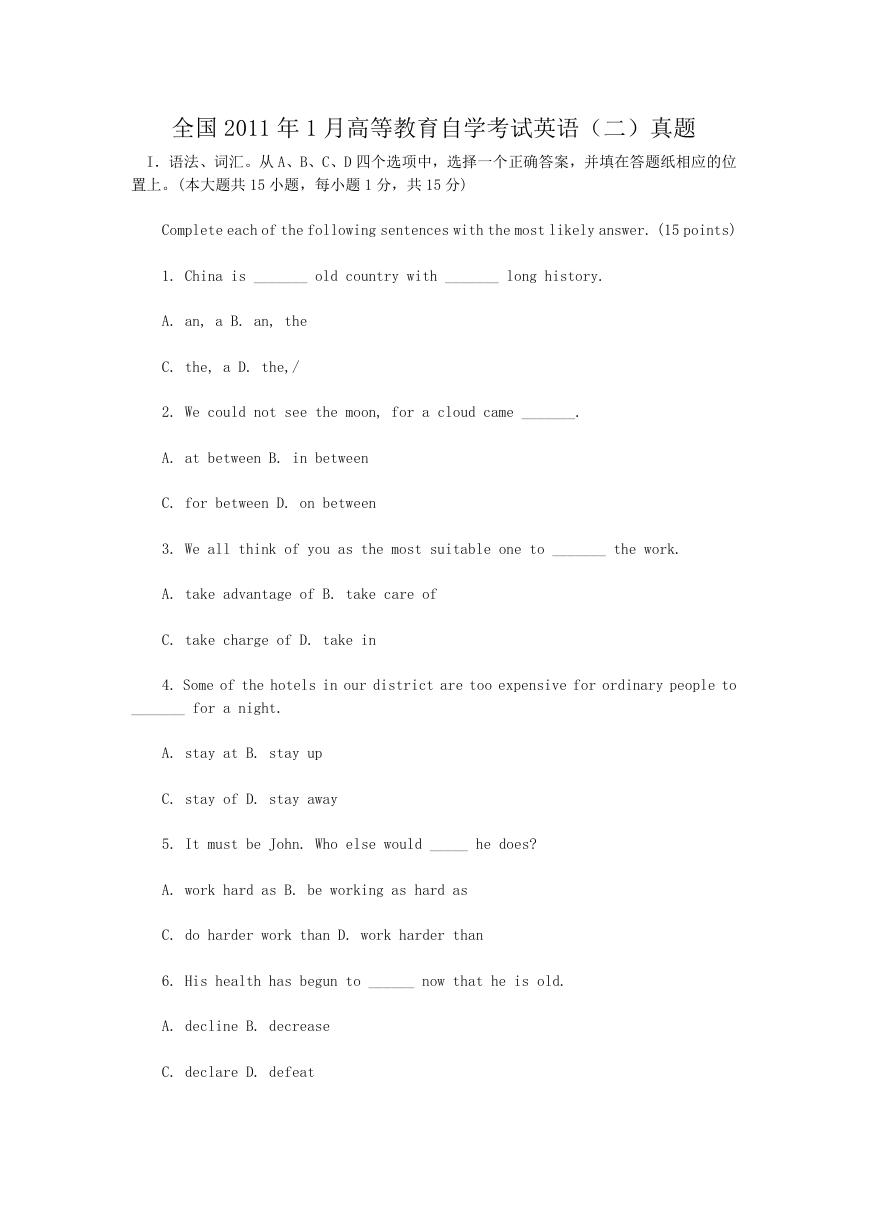
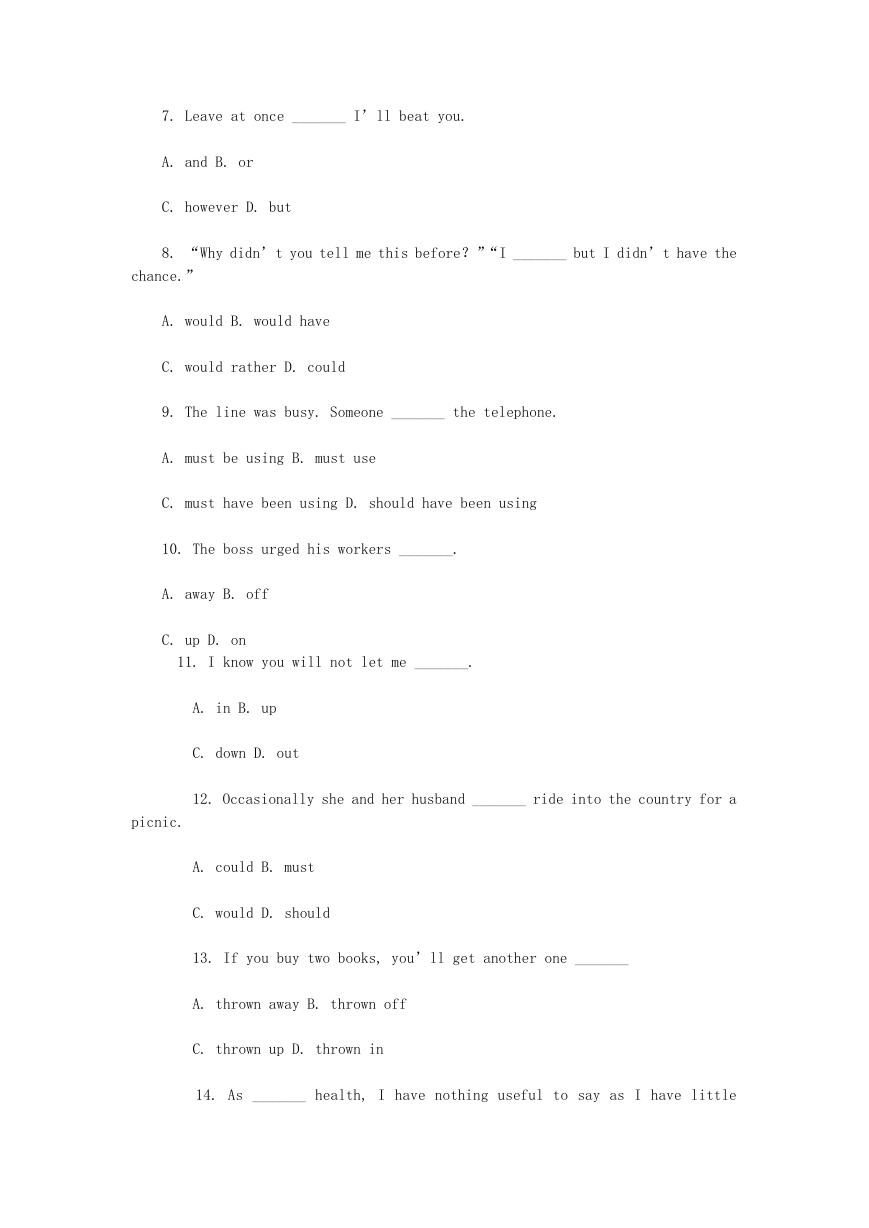
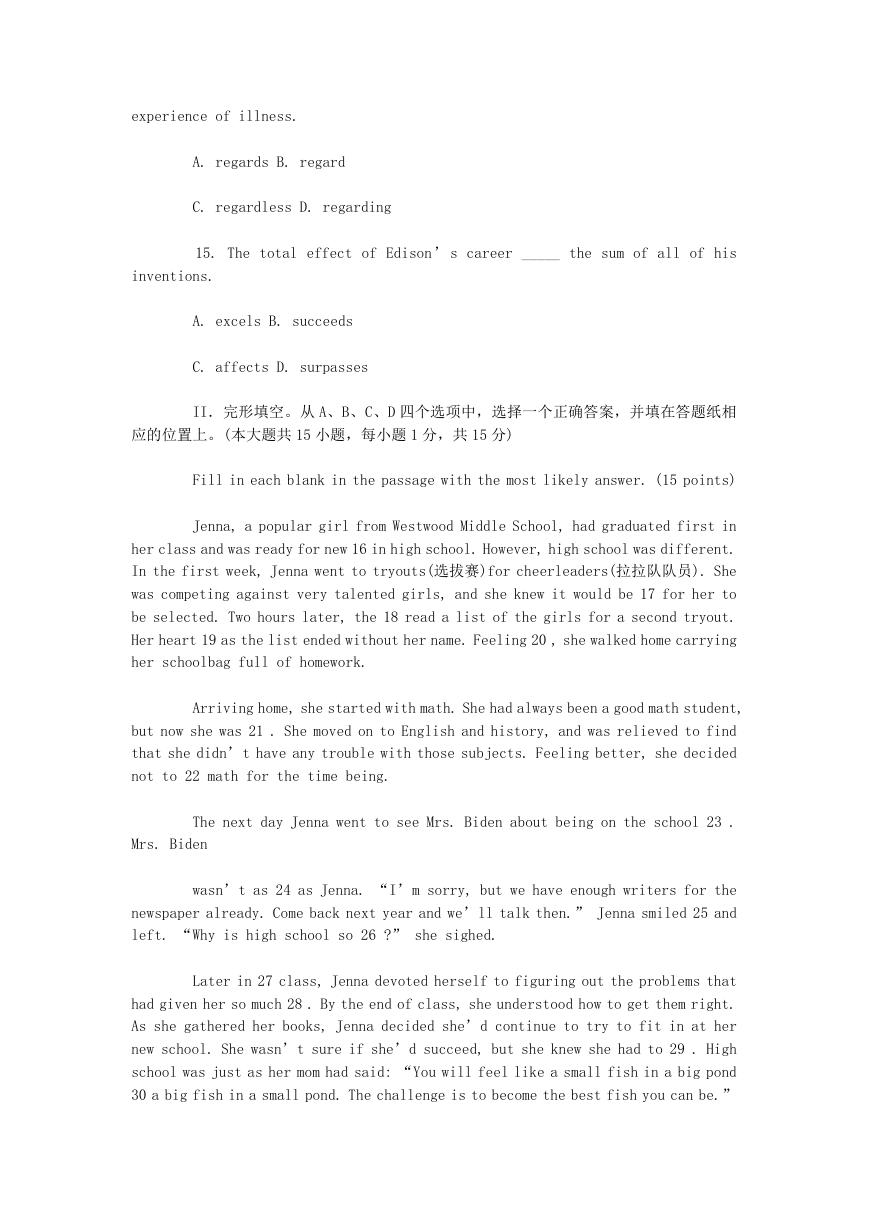
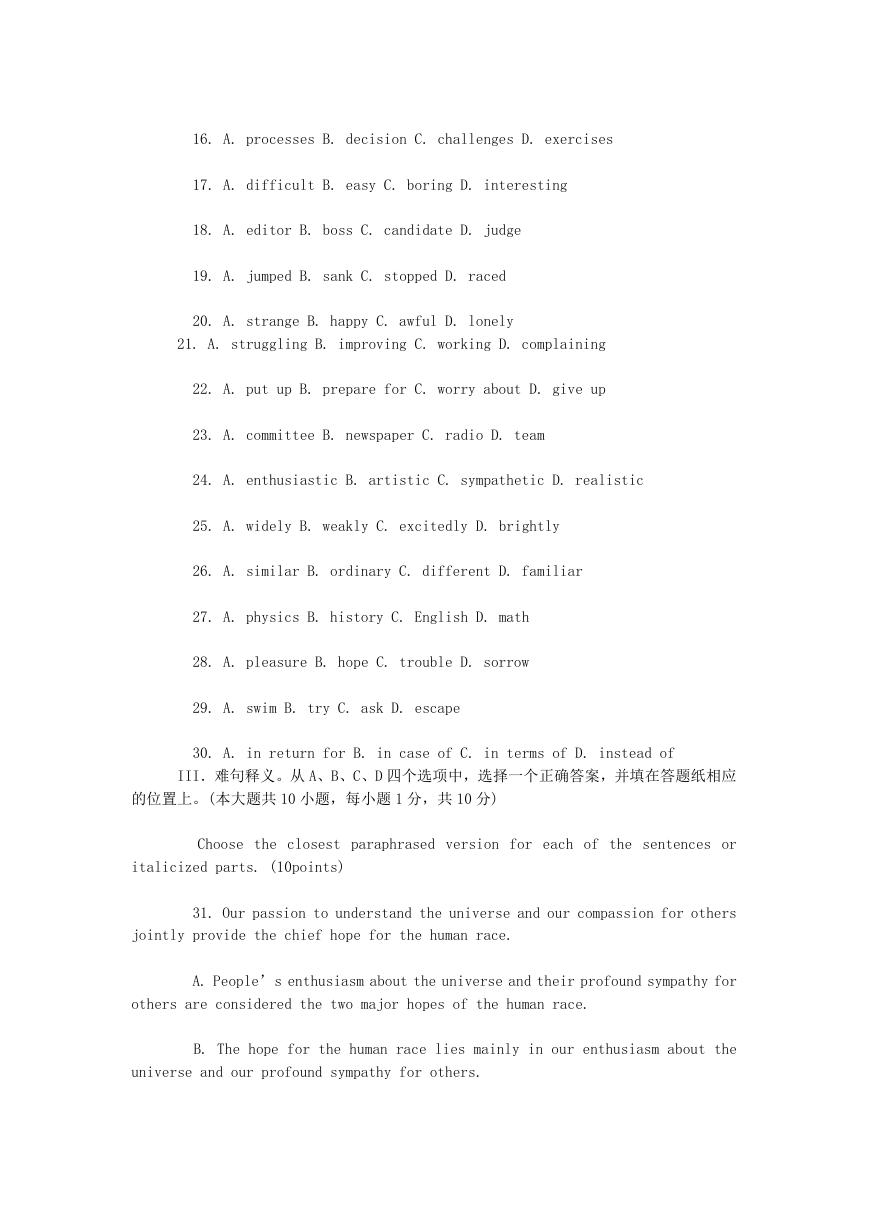
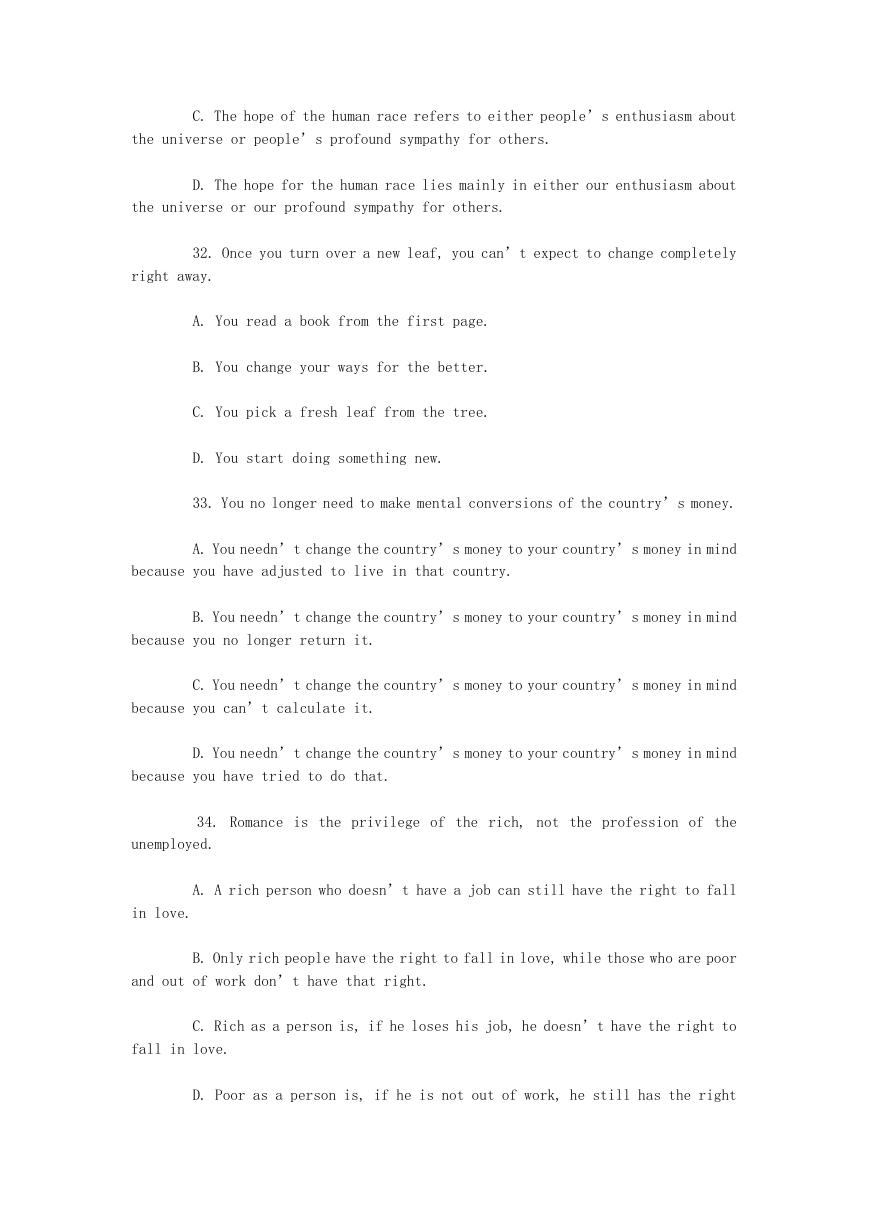
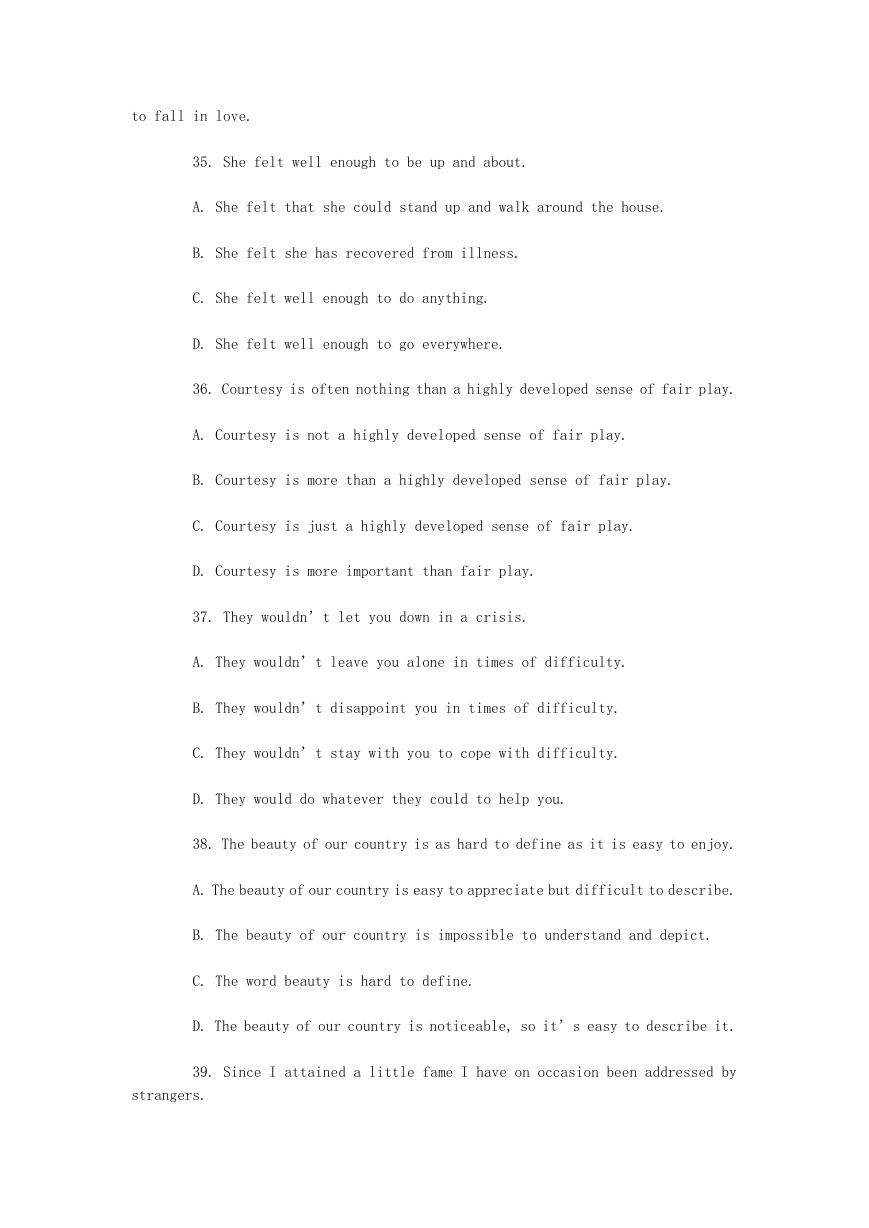
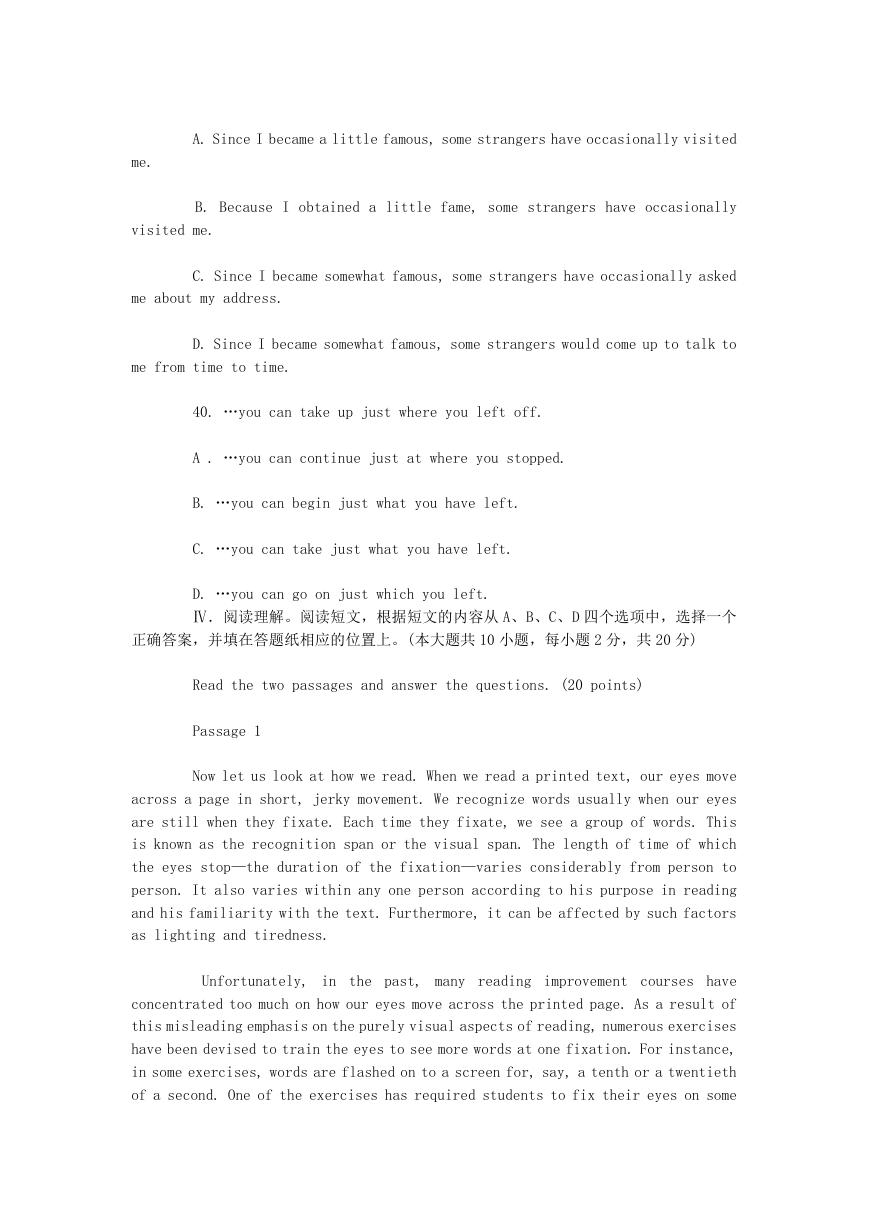









 2023年江西萍乡中考道德与法治真题及答案.doc
2023年江西萍乡中考道德与法治真题及答案.doc 2012年重庆南川中考生物真题及答案.doc
2012年重庆南川中考生物真题及答案.doc 2013年江西师范大学地理学综合及文艺理论基础考研真题.doc
2013年江西师范大学地理学综合及文艺理论基础考研真题.doc 2020年四川甘孜小升初语文真题及答案I卷.doc
2020年四川甘孜小升初语文真题及答案I卷.doc 2020年注册岩土工程师专业基础考试真题及答案.doc
2020年注册岩土工程师专业基础考试真题及答案.doc 2023-2024学年福建省厦门市九年级上学期数学月考试题及答案.doc
2023-2024学年福建省厦门市九年级上学期数学月考试题及答案.doc 2021-2022学年辽宁省沈阳市大东区九年级上学期语文期末试题及答案.doc
2021-2022学年辽宁省沈阳市大东区九年级上学期语文期末试题及答案.doc 2022-2023学年北京东城区初三第一学期物理期末试卷及答案.doc
2022-2023学年北京东城区初三第一学期物理期末试卷及答案.doc 2018上半年江西教师资格初中地理学科知识与教学能力真题及答案.doc
2018上半年江西教师资格初中地理学科知识与教学能力真题及答案.doc 2012年河北国家公务员申论考试真题及答案-省级.doc
2012年河北国家公务员申论考试真题及答案-省级.doc 2020-2021学年江苏省扬州市江都区邵樊片九年级上学期数学第一次质量检测试题及答案.doc
2020-2021学年江苏省扬州市江都区邵樊片九年级上学期数学第一次质量检测试题及答案.doc 2022下半年黑龙江教师资格证中学综合素质真题及答案.doc
2022下半年黑龙江教师资格证中学综合素质真题及答案.doc